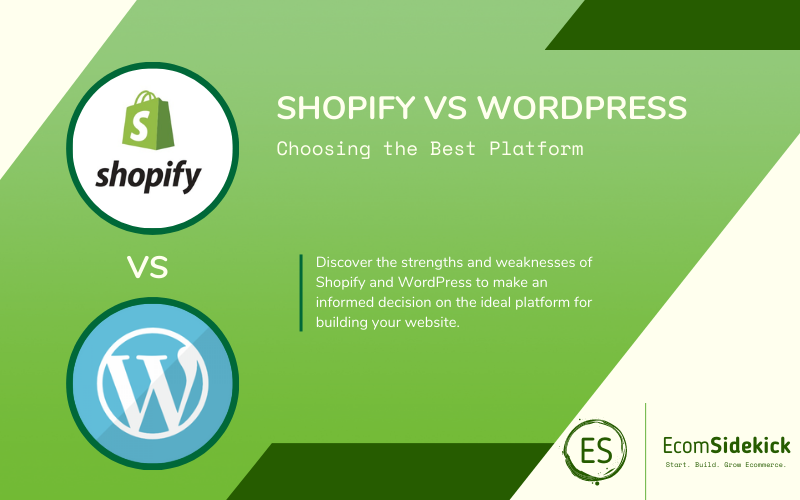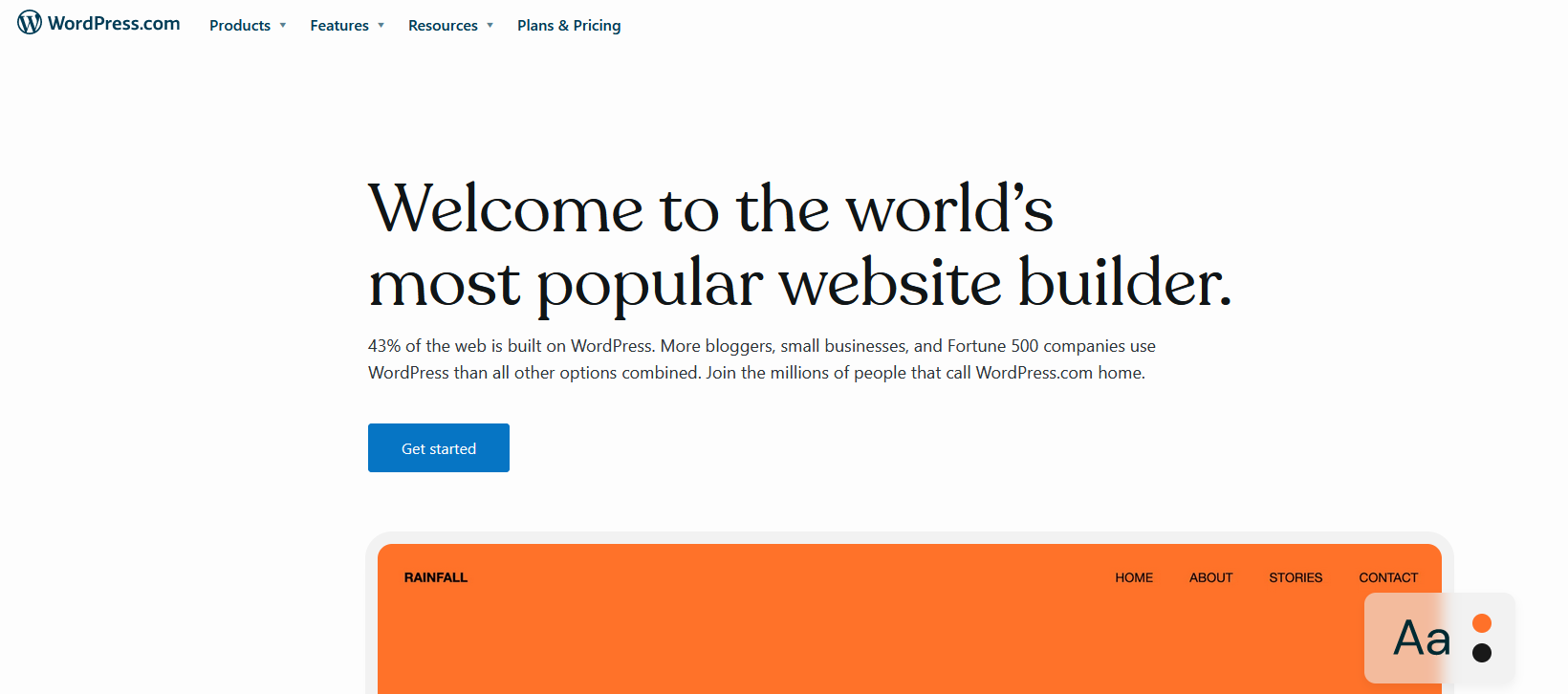Trying to find the best ecommerce platform for your website can be a difficult task. There are lots of options out there, but two of the most popular ones are Shopify and WordPress. They can each be used in different ecommerce business models.
They are both powerful tools that can help you to make complex websites without any coding or scripting knowledge, but it can be very hard to choose between them.

In this Shopify VS WordPress article, we’re going to break down the pros and cons of each platform to try and determine which is the best for you. We’ll take a detailed look at each, with reference to which kind of website you’re looking to create!
Shopify VS WordPress Quick Overview
In this section, we’re going to quickly break down which is better for your specific needs.
- Shopify: This is going to be the best choice for somebody with a small business who wants a simplistic, working online store. Shopify has some impressive features that help you list products, create an aesthetic through a list of themes, and some additional options for HTML and CSS coding if you have the skills to do so.
- WordPress: WordPress is a better all-rounder and can fit a lot of different website templates. If you’re looking to create a blog, extensive website, or eCommerce site, then this is going to be a great option for you. WordPress is a bit more complicated than Shopify and has a lot of different subscription options for your to take advantage of.
Shopify | WordPress | |
Pricing | Starter: at $5 per month | Free: $0 |
Templates? | Huge variety of different templates including paid ones. | Similarly, you get the choice between a lot of different simplistic templates for the look/feel of your website. |
User Interface | Very simplistic and easy to use, though a lot fewer options than WordPress | Very simplistic and easy to use, though a lot fewer options than WordPress |
Coding Options? | Some small coding options. | Self-Hosted WordPress allows you to create totally customized websites if you have the skills with coding. |
Best For? | A customer who wants to create a simplistic shop without any additional website features. | A customer who wants additional features on their website/multiple pages and parts of the site that don’t have anything to do with eCommerce. |
WordPress |
| |
Shopify |
|
What Is The Same Between The Two Platforms?
So then, we’ve given you a quick overview of some of the differences, but let’s take a look at what their key similarities are.
- Simplicity: Both WordPress and Shopify offer you a simple user interface that makes building a website easy. It doesn’t take long for you to set up an account and begin creating your website, and both allow you to do this without paying any money. There are differences between the two in terms of simplicity, but they have both been designed to make creating a website or eCommerce platform easy.
- Tools: Both give you some easy tools that let you customize your website further. There are some differences between the tools you’ll get for each, but both allow you to set up an online shop.
- Customer Support: Because Shopify and WordPress are some of the most popular website-building platforms, expect great customer support and accessibility options.
Shopify In-Depth Overview: Pros and Cons

Shopify is a web application created as a place for merchants to easily get into the world of eCommerce. It is a platform that allows you to quickly create their own online store. By giving access to a huge range of templates or themes, merchants can build their websites and customize them to fit their own brand. It fits merchants who want to sell either digital or physical products and has risen in popularity over the last 5 years.
The main design ethos of Shopify is to help users create a professional-looking online store without any technical knowledge. This means you don’t need any design skills or coding knowledge to create something that looks great. We’re going to give you a more in-depth look at the pros and cons of Shopify below.
Pros
Ease of Use
HTML and CSS Editing
Hostesd Solution
CONS
Transaction Fees
Customization
Lock-In Features
Pros
- Ease of Use: Even if you don’t have any experience designing websites, you’re bound to be able to make something that looks great with Shopify. In fact, it’s probably the most simplistic platform for creating websites. Simply pick a theme and customize it to fit your brand.
- HTML and CSS Editing: Althougsh it lacks the more robust customizability of WordPress and other websites, Shopify does support simplistic editing through the use of HTML and CSS. If you have some skills already, you’ll find that you can do a lot more and make a more unique site.
- Hostesd Solution: Shopify is a Hosted Solution, meaning that everything runs on its own servers. This is a great benefit as it means you won’t have to deal with the difficulties of web hosting or installing additional software. This is one of the main reasons why users choose Shopify as their solution.
Cons
- Transaction Fees: One thing users have to be aware of is the cost of transaction fees with some of their more extensive plans. Because of this, Shopify might end up costing you a lot more than you initially envision.
- Customization: Although there are options you can take to further customize your website with Shopify, their support and features pale in comparison to other websites such as WordPress.
- Lock-In Features: One thing you won’t run into until you try to leave the platform are some of the sneaky lock-in features that stop you from easily moving your store to a different location. If you’re thinking about using Shopify, keep in mind that you’ll likely be staying there for some time.
WordPress In-Depth Overview: Pros and Cons

WordPress is an online platform that allows you to create blogs, websites, and online stores (or some combination of the three). It’s worth noting that there are two different versions of WordPress that are slightly different.
Hosted WordPress is very similar to Shopify in the way it runs – in exchange for a monthly subscription, you can create and run your own website. However, there is also Self-hosted WordPress, which allows you to create and host your own website through the use of their open-source software—this allows you to have much more versatile customization options.
Pros
Simplicity
Customization
Plugins
CONS
Speed
Pricing
Pros
- Simplicity: Like Shopify, you’ll easily be able to create, manage and navigate through your site. Editing pages and uploading new content is easy, and there are lots of different templates for you to choose from and customize.
- Customization: If you use self-hosted WordPress, the world is your oyster. You’ll be able to make a completely unique website, but this does require some coding knowledge and design acumen.
- Plugins: WordPress has accumulated a huge variety of different paid and free plugins that you can add to customize without having to fiddle around with code. Once you get used to using plugins, you’ll find that you have a lot of different options to go with.
Cons
- Speed: The problem with having so many themes and plugins is that some of them have been created with sub-par code. Needless and badly designed lines of code can cause some themes to be unresponsive and slow, which can ruin the experience of a visitor. Without coding knowledge, it can be difficult to fix these problems.
- Pricing: If you want total customization within your WordPress site, you should know that this can get quite expensive. If you’re using paid themes and plugins, you might find that the price of your website goes up. That said, you can get around this with a little creativity and time.
Which Is Better For My Website? The Bottom Line
So then, how can we determine which is the best for your website? If you’re looking to create a simplistic online store and don’t care all that much about customization, then Shopify is a great choice for you. It’s simple, easy to use and won’t take up so much of your time. Though the transaction fees and lack of customization can be frustrating for some, it’s probably the simplest option you have before you—and that’s when compared to other platforms, not just WordPress.
If you want to make a larger website with additional customization, then we would suggest you go for WordPress. This is especially important if you’re looking to create a blog or website that isn’t just for eCommerce. The main downside of WordPress is that it’s harder to use, but it’s still relatively simple if you compare it to building your own website from scratch.
In view of this data, we have decided that Shopify is the winner. We hope that this article has helped you to understand the differences/similarities between them and that you’re now on the way to choosing the right platform for you!
Frequently Asked Questions
Is Selling on Shopify Profitable?
How profitable your Shopify store ends up being depends on a lot of different factors. Most merchants who sell on Shopify couple their work with extensive social media marketing, or they already have a base of customers that they’ve cultivated in real life. Some Shopify stores have become very profitable ventures.
What Alternatives Are There to Shopify?
Aside from WordPress, there are a few different options you can go for. There is Wix, which is best suited for smaller businesses, and Squarespace which can be used to make much larger websites with intricate designs.
How Long Does It Take To Get Good at Using WordPress?
You can consider WordPress as a platform that is easy to learn the basics and difficult to master. You can learn the basics of WordPress in a few weeks. However, if you want to get a full understanding of the more complex options you’ll have, this can take a lot longer, and requires knowledge of CSS and HTML coding.
Is Shopify Easier to Set Up and Use Compared to WordPress With WooCommerce?
Yes, Shopify is generally easier to set up and use for e-commerce. It offers a user-friendly interface and takes care of hosting, security, and technical aspects, allowing users to focus on building their online stores. WordPress with WooCommerce requires some technical knowledge, but it offers greater customization options.
Does Shopify or WordPress Have Better E-commerce Features and Integrations?
Both platforms offer a wide range of e-commerce features and integrations. Shopify provides a comprehensive set of built-in e-commerce tools, while WordPress with WooCommerce allows users to choose from thousands of plugins to add specific functionalities to their stores.
Paul Martinez is the founder of EcomSidekick.com. He is an expert in the areas of finance, real estate, eCommerce, traffic and conversion.
Join him on EcomSidekick.com to learn how to improve your financial life and excel in these areas. Before starting this media site, Paul built from scratch and managed two multi-million dollar companies. One in the real estate sector and one in the eCommerce sector.



